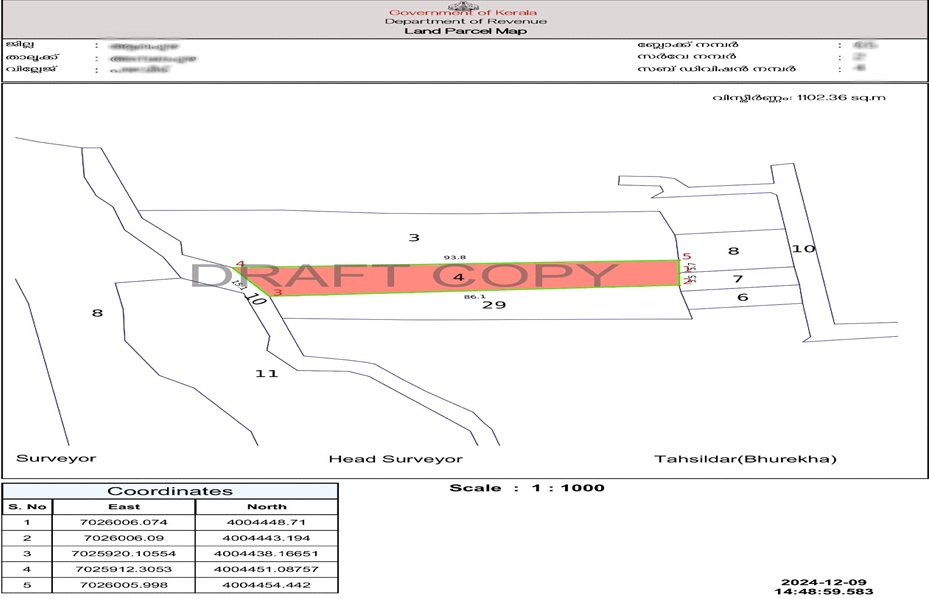What is an Encumbrance Certificate(EC) in Kerala?
An Encumbrance Certificate (EC) in Kerala is an official document issued by the Sub-Registrar Office (SRO) that shows the history of ownership and any transactions that affect a particular property—such as sales, mortgages, leases, gifts, or court attachments.It confirms whether a property is free from encumbrances (i.e., legal dues or claims). This makes it essential when buying, selling, or taking loans against property
Importance of Encumbrance Certificate(EC) in Kerala
- Proves Property Ownership History
Shows the chain of ownership and confirms who legally owns the property. - Confirms No Outstanding Loans or Mortgages
Helps verify that the property is not under any loan, mortgage, or legal claim. - Required for Home Loan Sanction
Banks and financial institutions require EC before approving property loans. - Needed for Property Registration & Mutation
Essential for registering a sale or transferring ownership in revenue records. - Used in Legal Disputes or Inheritance Cases
Serves as legal proof in court cases, succession claims, or property disputes. - Essential for Buying or Selling Property
Protects buyers by ensuring the property is free from previous sales or liabilities. - Supports Land Conversion or Development
Needed while converting land use from agricultural to residential or commercial. - Required for Government Subsidies or Schemes
Acts as proof of ownership when applying for housing schemes or land benefits. - Helpful in Property Tax Updates
Used for updating property tax records in local bodies like municipalities or panchayats. - Valid Document for Title Verification
Used by advocates and legal experts to verify clean property title. - Prevents Fraudulent Sales
Ensures that the seller has legal rights and that the property isn’t disputed. - Required for Building Plan Approval
Some local bodies require EC to approve construction or layout plans.
How to download and apply EC online in Kerala ?
You can download EC online easily via mypatta without visiting the Sub-Registrar office.
Steps to Download Encumbrance Certificate (EC) online:
- Open mypatta and log in or sign up if needed.
- Go to property documents, ensure “Kerala” is selected as the state, then tap the “EC” icon.
- Enter District ,SRO,Document Number and Registration year details.
- Tap “Search”
- Once EC is available to download, tap “View Document”. You can now save or share or download this document in PDF on your device.
What Details Does a Kerala EC Contain?
A typical Kerala Encumbrance Certificate(EC) includes:
- Property Details: The EC starts by listing the property’s full address and description (village, survey number, extent, etc.)
- Transaction History: It then shows a list of all registered transactions on that property. Each entry notes the date, type of transaction (sale, mortgage, release, etc.), and the names of the parties involved.
- Status of Encumbrances: It also shows whether any liens or mortgages are currently on the property. If the EC is clean, this will indicate “No Encumbrance” or similar.
Together, these details give a clear snapshot of the property’s legal status. By reviewing the EC, a buyer or lender can verify every past deal and ensure nothing is missing or hidden.
Encumbrance Certificate (EC) vs Certified Copy in Kerala
An Encumbrance Certificate (EC), on the other hand, shows if there are any past transactions or legal dues on a property. It helps you check whether a property is legally clear and is mostly used while buying property or applying for a home loan.A Certified Copy is an official copy of a registered document. It shows the full details of that document – like who bought or sold the property, property boundaries, and signatures. It’s useful when you lose the original document or need to show proof in court, for legal heir claims, or property transfers.
In short:
- EC = History of all transactions on the property
- Certified Copy = Full copy of one document
Frequently Asked Questions (FAQs)
1.Can an Encumbrance Certificate show joint ownership of a property?
Yes, if a property has joint ownership, the EC will reflect the names of all owners and their respective shares or interests in the property as recorded in the transactions.
2.Can I use a digitally signed Encumbrance Certificate for bank loans?
Yes, a digitally signed Encumbrance Certificate is accepted by most banks and financial institutions for loan processing, as it is legally valid and certified.
3.Can I access the EC for a property that is not registered online?
No, the EC can only be generated for properties registered in the Kerala Registration Department’s digital database.
4.Is a digitally signed Encumbrance Certificate mandatory for property transactions?
Yes, a digitally signed Encumbrance Certificate is often mandatory for property transactions to verify the legal and financial status of the property, ensuring there are no disputes or liabilities.
5.Can I request a digitally signed Encumbrance Certificate for properties owned by others?
Yes, a digitally signed Encumbrance Certificate can be requested for any property, as it is public information. However, you must provide sufficient property details like document number or registration details.
Key Takeaway
- The Encumbrance Certificate (EC) in Kerala is a vital document confirming that a property is free from legal or financial claims.
- You can easily apply for an EC online, view it digitally, and download it in minutes using mypatta.
- Checking the EC is essential before buying or investing in property to ensure a safe and secure transaction.
- The EC provides legal and financial clarity, helping avoid disputes and fraudulent transactions.



